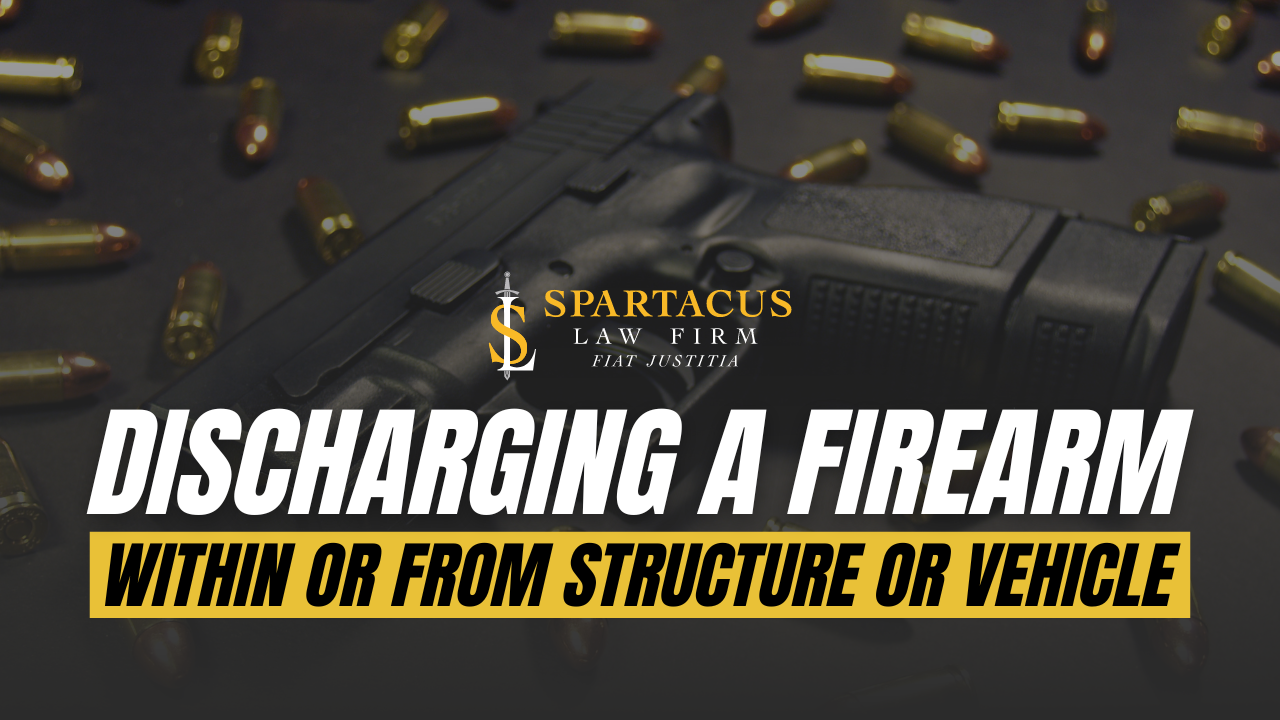Discharging a Firearm Within or From Structure or Vehicle NRS 202.287
NRS 202.287 prohibits Wantonly or Maliciously shooting a gun from inside a vehicle or structure located within the State of Nevada. A structure can be considered a house, apartment, shop, office building, or even something amorphous such as a tent.
A vehicle is any motor vehicle or trailer designed for use with a motor vehicle, whether or not it is self-propelled, operated on rails or propelled by electric power obtained from overhead wires. Exceptions to the above statute include:
- Self-Defense;
- Acting within the lawful course of your business;
- A police office or licensed hunter.
1. A person who is in, on or under a structure or vehicle and who maliciously or wantonly discharges or maliciously or wantonly causes to be discharged a firearm within or from the structure or vehicle:
(a) If the structure or vehicle is not within an area designated by city or county ordinance as a populated area for the purpose of prohibiting the discharge of weapons, is guilty of a misdemeanor.
(b) If the structure or vehicle is within an area designated by city or county ordinance as a populated area for the purpose of prohibiting the discharge of weapons, is guilty of a category B felony and shall be punished by imprisonment in the state prison for a minimum term of not less than 1 year and a maximum term of not more than 10 years, or by a fine of not more than $5,000, or by both fine and imprisonment.
2. If a firearm is discharged within or out of any vehicle that is in motion or at rest and it cannot with reasonable certainty be ascertained in what county the crime was committed, the offender may be arrested and tried in any county through which the vehicle may have run on the trip during which the firearm was discharged.
3. The provisions of this section do not apply to:
(a) A person who lawfully shoots at a game mammal or game bird pursuant to subsection 2 of NRS 503.010.
(b) A peace officer while engaged in the performance of his or her official duties.
(c) A person who discharges a firearm in a lawful manner and in the course of a lawful business, event or activity.
4. As used in this section:
(a) “Structure” means any temporary or permanent structure, including, but not limited to, any tent, house, room, apartment, tenement, shop, warehouse, store, mill, barn, stable, outhouse or other building.
(b) “Vehicle” means any motor vehicle or trailer designed for use with a motor vehicle, whether or not it is self-propelled, operated on rails or propelled by electric power obtained from overhead wires.
The crime of DISCHARGING A FIREARM WITHIN OR FROM A STRUCTURE OR VEHICLE in violation of NRS 202.287 consists of the following elements:
(1) The Defendant is in, on, or under a [structure or vehicle]; and
(2) Maliciously or wantonly;
(3) Discharges a firearm or causes a firearm to be discharged;
(4) Within or from the [structure or vehicle];
(5) While within an area designated by city or county ordinance as a populated area for the purpose of prohibiting the discharge of weapons.
Frequently Asked Questions
How Is A Firearm Defined?
“Firearm” means any device designed to be used as a weapon from which a projectile may be expelled through the barrel by the force of any explosion or other form of combustion.
How Is A Structure Defined?
“Structure” means any temporary or permanent structure, including, but not limited to, any tent, house, room, apartment, tenement, shop, warehouse, store, mill, barn, stable, outhouse or other building.
How Is A Vehicle Defined?
“Vehicle” means any motor vehicle or trailer designed for use with a motor vehicle, whether or not it is self-propelled, operated on rails or propelled by electric power obtained from overhead wires.
How Is Wantonly Defined?
To act “wantonly” is to unreasonably or maliciously risk harm while being utterly indifferent to the consequences.
How Is Maliciously Defined?
To act “maliciously” is to act with an evil intent, wish or design to vex, annoy or injure another person. The condition of mind described by “maliciously” may also be inferred from an act done in willful disregard of the rights of another, or an act wrongfully done without just cause or excuse, or an act or omission of duty betraying a willful disregard of social duty.
How Can I Defend Against These Charges?
In order to be convicted of a violation of NRS 202.287 the State must prove that you acted maliciously or wantonly. If the State can not prove your mens rea (mental intent) then you can not be convicted of a violation of NRS 202.287.
If you were acting in self-defense you can not be convicted of NRS 202.287. Acting in self-defense lacks the elements of maliciousness or acting wantonly. If you were in reasonable apprehension or fear of bodily harm, then this is a defense to the violation.
If you are a police officer you are immune to prosection during the course and scope of your duties. There is also a hunting exception under certain conditions.
What Are The Penalties For A Violation of NRS 202.287?
If the structure or vehicle is not within an area designated by city or county ordinance as a populated area for the purpose of prohibiting the discharge of weapons, is guilty of a misdemeanor, punishable by:
- 6 months in jail and/or
- Up to $5,000 in fines
If the structure or vehicle is within an area designated by city or county ordinance as a populated area for the purpose of prohibiting the discharge of weapons, is guilty of a category B felony and punishable by:
- a minimum term of not less than 1 year and a maximum term of not more than 10 years, or by a
- fine of not more than $5,000, or by both fine and imprisonment.
Contact A Las Vegas Criminal Defense Attorney Today
If you’ve been charged with firing a gun from a car or structure, our legal team can help defend against the charges, and help you secure the best possible outcome for your case. Contact our experienced Las Vegas criminal defense attorney, Chandon Alexander, for an in-depth case review and to begin planning your defense.
NRS 202.287; NRS 202.253; NRS 193.0175; Black’s Law Dictionary (10th ed. 2014); Ewish v. State, 110 Nev. 221, 229 n.4, 871 P.2d 306, 312 n.4 (1994); State v. Second Judicial District Court, 136 Nev. 191, 195–99, 462 P.3d 671, 674–77 (2020); Washington v. State, 132 Nev. 655, 662, 376 P.3d 802, 807–08 (2016); McCurdy v. State, 107 Nev. 275, 278, 809 P.2d 1265, 1266–67 (1991); Hern v. State, 97 Nev. 529, 532, 635 P.2d 278, 280 (1981).






